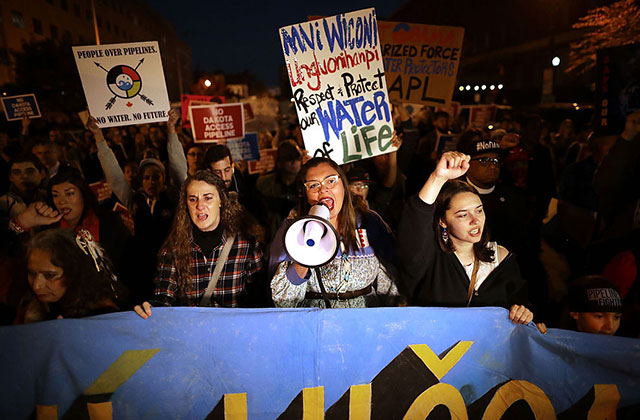The developers of the Dakota Access Pipeline may have to wait until early 2017 before finding out if they can finish construction.
The Associated Press is reporting that U.S. District Court Judge James Boasberg will need to decide whether Energy Transfer Partners, the company behind the pipeline, has the legal right to build near Lake Oahe. This decision came after the company filed a lawsuit against the Army Corps of Engineers Tuesday (November 15).
The Standing Rock Sioux Tribe Chairman Dave Archambault II had noted in a press release sent to Colorlines that the pipeline company’s shipper contracts would expire if they are not delivering oil by January 17, 2017.
In further setbacks for the company, more groups are supporting the Standing Rock Sioux Tribe and the water protectors on the front lines of the #NoDAPL fight in southern North Dakota. Today (November 17), Indigenous people all around the world are converging at the 22nd Conference of the Parties to the United Nations Framework Convention on Climate Change to voice their solidarity with Standing Rock through a direct action inside the conference, according to a release from the Indigenous Environmental Network.
Those speaking include Kevin Hart of the Assembly of First Nation of Canada, Kapupu of the Democratic Republic of Congo and representatives from the Marshall Islands, the Pacific, Latin America, the Caribbean and the Arctic.
The statement reads:
The International Indigenous Peoples’ Forum on Climate Change condemns the construction of the Dakota Access Pipeline and stands in solidarity with our relatives of the Standing Rock Sioux Tribe and all [w]ater [p]rotectors in opposition to this project, citing that “[t]he Dakota Access Pipeline is being built on the unceded treaty lands of the Standing Rock Sioux Tribe, without their free, prior and informed consent, as is described in the U.N. Declaration on the Rights of Indigenous Peoples in Articles 18, 19, and 32. The pipeline is also being constructed through sacred areas and ancestral burial grounds of the Standing Rock Sioux and other Indigenous Peoples of the area.”
Also, on November 15, over 300 cities took part in a day of action to protest the pipeline too. In New York City, police arrested 39 people, according to Greenpeace.
(H/t AP)
